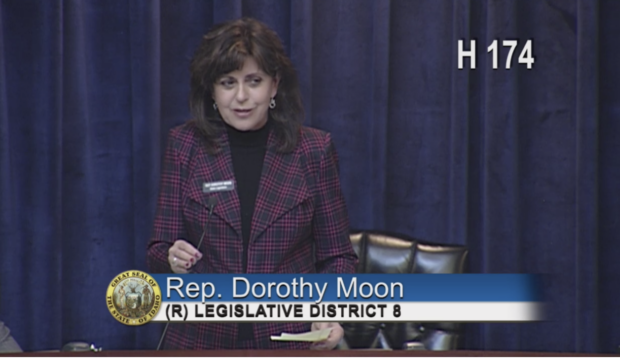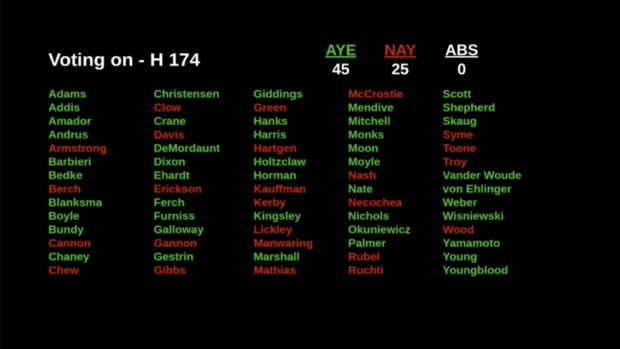
The Idaho House of Representatives Monday passed a bill to allow school districts to decide whether to engage in labor negotiations with teachers unions.
Idaho law requires school districts to engage in labor negotiations with teachers unions, if the majority of teachers are represented by the union.
House Bill 174, sponsored by Rep. Dorothy Moon, R-Stanley, would make that optional. Her bill changes one word in the section of law that says districts and education associations “shall” enter into negotiations to “may” enter into negotiations.
If the bill passes, districts could implement salaries and benefits without having to negotiate or agree with teachers’ representatives. The Idaho Education Association and teachers spoke against the bill in committee, while the Idaho Freedom Foundation and some parents supported it.
Moon says the bill would give districts more flexibility on whether to engage with a union, especially if the union “acts poorly.”
“A union that acts poorly must still be afforded negotiation, and this would change that,” Moon said Monday. “So, if they act poorly you can still negotiate — but negotiate with the teachers directly.”

The bill passed on a 45-25 vote, with 13 Republicans joining the House’s 12 Democrats in opposition.
Two Republican House Education Committee leaders joined Democrats in opposing the bill on the House floor. Chairman Lance Clow, R-Twin Falls, said he worries the bill would damage teacher morale.
Vice Chairman Ryan Kerby, R-New Plymouth, said the bill probably wouldn’t change negotiation practices at large or small school districts, but could be a potential problem at mid-sized districts where administrators and the teachers union are in conflict.
“If there’s bad blood, they’re not getting along with each other, the board can tell these guys, with this language, to take a flying hike. It’s going to make a bad relationship worse,” Kerby said. “It’s going to have a net negative affect.”
Representatives Julie Yamamoto, R-Caldwell, and Barbara Ehardt, R-Idaho Falls, spoke in favor.
“When you say collaborate and you say that you ‘may,’ that sounds like collaboration. When you say ‘shall’ that sounds like you have to,” said Yamamoto, a former Vallivue administrator. “Boards are going to want to hear what the majority of their teachers have to say.”
Moon called the West Ada school district the “poster boy” for the bill. In October, the West Ada Education Association held a teacher sickout to protest the district’s plans to offer hybrid in-person classes while Ada County was in the highest risk category for coronavirus. Hundreds of teachers called in sick, and the district abruptly canceled school for two days because it couldn’t find enough substitute teachers to cover the absences.
However, West Ada’s sickout wasn’t part of labor negotiations between the district and union — the agreement was already in place for the year.
It also isn’t clear that passing HB 174 would block a future sickout attempt. The West Ada Education Association announced the sickout during a virtual meeting of its members, not during labor negotiations or a school board meeting.
With the House vote, HB 174 now heads to the Senate.
Ybarra’s in-person learning bill heads to Senate floor
After debating whether the bill was even needed, the Senate Education Committee approved state superintendent Sherri Ybarra’s face-to-face learning bill.
House Bill 175 would require local schools to offer an in-person learning option during an emergency, “to the greatest extent possible.”
The goal is to make sure that in-person learning is the state’s preferred option, Ybarra said, and not an “afterthought.” And Ybarra argued that a statement on in-person learning is needed, since contagious coronavirus variants could hit Idaho in the weeks to come.
“We are not out of the woods yet,” she said.
But two Republican senators — Carl Crabtree of Grangeville and Kevin Cook of Idaho Falls — questioned whether HB 175 would make a difference.
“This would make a great memo to every school board and every superintendent,” Cook said. “I don’t see the need for a bill.”
Senate Education Chairman Steven Thayn argued that the bill would give parents leverage to demand an in-person learning option.
“I think it’s a fairly significant bill,” said Thayn, R-Emmett. “It makes a statement that’s important.”
On a voice vote, with Crabtree and Cook voting no, HB 175 heads to the Senate floor. It has already passed the House.
Charter facilities bill sails through the house
A bill to freeze charter facilities funding, proposed by House Education Chairman Lance Clow, R-Twin Falls, sailed through the House without a single no vote. It heads next to the Senate.
The bill would protect charter schools from cuts to building funds if Idaho were to slash education spending.
Public charter schools, unlike traditional districts, can’t use bonds or levies to raise money for buildings. In 2013, the state created a Charter School Facilities Fund distributed in a per-student formula. But the fund has a catch: If the state cuts education spending, the charter school fund is reduced automatically. The state spends about $10 million a year on charter school facilities.
House Bill 264 would essentially freeze the current facilities fund formula, removing that automatic decrease.
Idaho Education News reporter Kevin Richert contributed to this report. Reporting by former EdNews staffer Clark Corbin also contributed.
